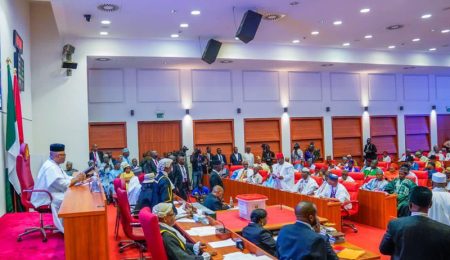Former Minister of Foreign Affairs, Professor Bolaji Akinyemi, has urged President Bola Tinubu to appoint a special adviser on foreign policy within the Villa to ensure that international agreements signed by the president are properly implemented.
Speaking in an interview on ARISE News on Thursday, Akinyemi said: “ The president is really the chief marketer for Nigeria. He markets the country. And when we have ambassadors on seat all over the world, the president does that job effectively. But as I said, and I think you are right to always remind us, it is implementation when those agreements are brought back home. And I think the message should be addressed to the civil servants.”
The former minister, however, stressed that the presidency itself currently lacks the necessary structure to ensure follow-through. “There is a lacuna in the villa at the moment. I don’t know who is handling foreign affairs. Once the president comes back, his attention goes to domestic issues. And God knows there are enough domestic issues for him to concentrate on. He needs an advisor on foreign policy in the villa, who also will now keep an eye on the Ministry of Foreign Affairs to ensure that these agreements are implemented.”
Akinyemi also faulted the government for leaving Nigeria without ambassadors for over two years, calling the situation “very unusual.” He said: “Well, it is a very unusual position for two years not to have ambassadors in post. I think the president owes us really an explanation. There must be something there. And that makes it in a way difficult for me to explain. It’s not my job to explain, it’s the job of the foreign minister or Bayo Onanuga to explain why we don’t have ambassadors in post. It cannot be due to lack of money.”
According to him, the absence of ambassadors undermines Nigeria’s diplomatic standing and aspirations at the United Nations. “Governments or countries interpret your feeling towards them, how you grade them, by whether you have a fully functioning embassy. When you leave the top posts empty, in a way, yes, the president can go visiting, and yes, they will give him all the honours and give him all the attention. But on every day-to-day activities on the diplomatic plane in each country, they notice your ambassador is not there. And when you don’t have an ambassador at post who has taken several opportunities to raise issues like Nigeria’s campaign for a permanent seat on the UN Security Council, a chargé d’affaires cannot perform that position. No, it doesn’t work that way.”
Responding to claims that financial constraints were the reason behind the delay, Akinyemi disagreed. “How could it be a money issue when you are increasing the revenue that’s coming from the federal allocation to states? You are increasing the money that is going to the National Assembly to increase the allowances and so on. We are not a poor country. The federal government is not a poor agency. It’s not about to go broke. The excess revenue that has been generated in the past one year—why should the foreign ministry not have gotten the share that it needs to keep embassies running? There must be something there. I don’t know what it is.”
The former minister further criticised the optics of African leaders attending mass summits convened by world powers. “Optic-wise, I never liked the idea of all African leaders marching into a country for a conference. Japan summons us and we all go. China summons us and we all go. Turkey summons us and we all go. I have never liked it. And optic-wise, to me, it looks disgraceful. Master summoning servants, master summoning slaves. I have no objection at all to one-on-one diplomacy, one-on-one conferences. But a situation where one country summons 54 African leaders and they all go, I have never liked it.”
He added that African countries also lack the technical capacity to negotiate effectively at such gatherings. “We must accept that diplomacy has become the art of specialists. Before they come for a conference, the Chinese have already spent six months looking at what they intend to achieve, and their documents are ready. In Africa, do we use experts, or do we simply regard it as a bureaucratic thing? The bureaucratisation of issues is going to be the death of Africa. We have to accept that there are specialisations, and those specialisations have to keep people on desk. Before you go to these conferences, what do you intend to achieve? What are the best deals that you can get? But what we do is to even depend on documents prepared by the other side. We never get the best that even China is prepared to offer, because we are looking at minor things that we should not even be interested in.”
On Nigeria’s historical ties with Brazil, Akinyemi rejected suggestions that relations had soured during his tenure under General Ibrahim Babangida. “The loss of position between Brazil and Nigeria—I don’t remember the issue coming up, honestly. If it has come up, I bet you IBB would. IBB was an activist, not only as a president, but also in foreign affairs. If it had been brought to my attention that Brazil and Nigeria were at loggerheads, I would have acted. In fact, when I was putting together the concert of medium powers, Brazil was one of the countries that I nominated, and they attended all the conferences. So our relationship with Brazil was very good. And in my conception, Brazil was one of the countries that we should be growing with at par.”
Boluwatife Enome
Follow us on:
